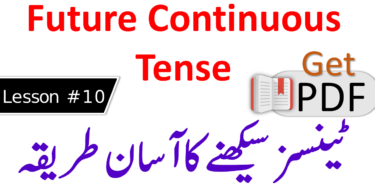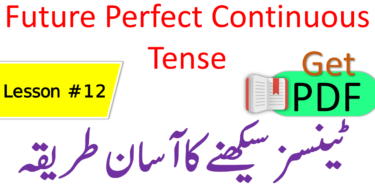The Future Perfect Tense is used to describe actions that will be completed before a specific time in the future. It helps express certainty, predictions, and assumptions about events that will have happened. Understanding this tense improves English fluency and sentence accuracy. In this blog post, you’ll learn Future Perfect Tense in Urdu along structure, rules, and common mistakes with Urdu translations. Master this tense with simple explanations and real-life examples.
👉 Learn more grammar to improve your English! 🚀
Table of Contents
Future Perfect Tense in Urdu
The Future Perfect Tense is used to describe an action that will be completed before a specific point in the future. It expresses certainty that something will have happened by a certain time.
(1) Affirmative Sentences (مثبت فقرات)
Structure:
➡ Subject + will/shall + have + past participle (3rd form of verb) + object
📌 Note:
Traditionally, “shall” is used with “I” and “we”, while “will” is used with all other subjects.
However, in modern English, “will” is commonly used with all subjects.
| Subject | Helping Verb | Main Verb (3rd form) | Object |
|---|---|---|---|
| I | Shall have | Gone | To school |
| We | Shall have | Completed | The project |
| You | Will have | Learned | The lesson |
| He/She/It/Azhar | Will have | Finished | His work |
| They/Boys | Will have | Eaten | Dinner |
Examples:
He will have gone to Karachi.
وہ کراچی جا چکا ہوگاShe will have done her work.
وہ اپنا کام کر چکی ہوگیYou will have heard this news.
تم یہ خبر سن چکے ہوHe will have gone to Changa Manga with his wife.
وہ اپنی بیوی کے ساتھ چھانگا مانگا جا چکا ہوگاThey will have taken tea before I come.
میرے آنے سے پہلے وہ چائے پی چکے ہونگےWe shall have reached home before sunset.
سورج غروب ہونے سے پہلے ہم گھر پہنچ چکے ہونگےPeople will have said their prayers.
لوگ نماز پڑھ چکے ہونگےImran will have learned his lesson.
عمران اپنا سبق یاد کر چکا ہوگا
(2) Negative Sentences (منفی فقرات)
Structure:
➡ Subject + will/shall + not + have + past participle (3rd form of verb) + object
| Subject | Helping Verb | Negative | Main Verb (3rd form) | Object |
|---|---|---|---|---|
| I | Shall not have | Finished | My work | |
| We | Shall not have | Reached | The station | |
| You | Will not have | Learned | The lesson | |
| He/She/It/Azhar | Will not have | Taken | The medicine | |
| They/Boys | Will not have | Completed | The project |
Examples:
He will not have gone to school.
وہ سکول نہیں جا چکا ہوگاShe will not have ironed the clothes.
وہ کپڑے استری نہیں کر چکی ہو گیThe gardener will not have watered the plants.
مالی نے پودوں کو پانی نہیں دیا ہوگاThe cook will not have made the breakfast.
باورچی نے ناشتہ نہیں بنایا ہوگاI shall not have learned my lesson till tomorrow.
میں نے کل تک اپنا سبق نہیں یاد کیا ہوگاThe peon will not have rung the bell.
چپڑاسی گھنٹی نہیں بجا چکا ہوگاHe will not have taken tea before I get up.
میرے جاگنے سے پہلے وہ چائے نہیں پی چکا ہوگا
(3) Interrogative Sentences (سوالیہ فقرات)
Structure:
➡ Will/Shall + subject + have + past participle (3rd form of verb) + object?
| Helping Verb | Subject | Have | Main Verb (3rd form) | Object |
|---|---|---|---|---|
| Will | He | Have | Finished | His work? |
| Will | She | Have | Completed | The assignment? |
| Will | They | Have | Learned | The lesson? |
| Shall | We | Have | Arrived | On time? |
| Will | You | Have | Taken | The medicine? |
Examples:
Will he have gone home?
کیا وہ گھر جا چکا ہوگا؟Will she have taken food?
کیا وہ کھانا کھا چکی ہو گی؟Will they have finished their work?
کیا وہ اپنا کام مکمل کر چکے ہوں گے؟Will you have taken a bath before the evening?
کیا تم شام سے پہلے نہا چکے ہوگے؟Will the carpenter have made the chairs?
کیا بڑھئی کرسیاں بنا چکا ہوگا؟Shall I have written a letter before he returns?
کیا اس کے واپس آنے سے پہلے میں خط لکھ چکا ہوں گا؟Will he have left?
کیا وہ جا چکا ہوگا؟Will she have gone to bed?
کیا وہ سو چکی ہو گی؟
Uses of Future Perfect Tense
To indicate an action that will be completed before a specific time in the future:
I will have completed my assignment before the deadline.
They will have finished their meal by the time we arrive.
To show certainty about an action that will happen in the future:
By next year, she will have graduated from university.
By noon, the guests will have arrived.
For assumptions about past actions in the future:
He will have left for the airport by now.
You will have already heard the news.
Common Mistakes to Avoid
❌ Wrong: I will have goes to school.
✅ Correct: I will have gone to school.
❌ Wrong: She will not have eats breakfast.
✅ Correct: She will not have eaten breakfast.
❌ Wrong: Will he have to complete the project?
✅ Correct: Will he have completed the project?
Key Differences Between Future Perfect & Other Future Tenses
| Tense | Structure | Example |
|---|---|---|
| Future Simple | Will/Shall + Base Verb | I will complete my work. |
| Future Continuous | Will/Shall + Be + Verb-ing | I will be completing my work. |
| Future Perfect | Will/Shall + Have + 3rd Form | I will have completed my work. |
📌 Tip: The Future Perfect Tense is always used with time expressions like:
By tomorrow, By next week, Before sunset, By the time, Before he arrives, etc.
You May Also Like





